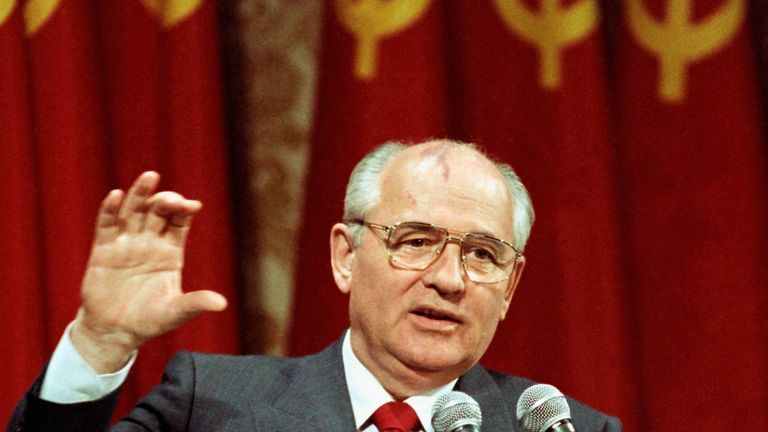Gorbachev’s legacy is now a wind of change of a different kind
Mikhail Gorbachev did not intend to bring about the fall of the Soviet Union – his role in ending communism was more accident than design.One of the great men of the late twentieth century – in fact any century – he will forever be associated with the concepts of glasnost and perestroika; openness and restructuring.
A child of Stalin’s system of repression, he knew the USSR was not working and was determined to bring about reform and a better quality of life for the people living under communist rule.But his reforms, which were meant to reinvigorate the centrally planned economy, unleashed forces that he could simply not control.Greater freedom of speech and democratisation is a heady mix and giddy on their promise the Soviet bloc quickly started unravelling.
In Germany, the Berlin Wall was pulled down and with it what was known as the Iron Curtain.Mr Gorbachev was not a leader who had the stomach to send in tanks or soldiers – there would be no repeat of what happened following the Hungarian uprising of 1956, or the Prague Spring of 1968.
More on Mikhail Gorbachev
Related Topics:
The Brezhnev doctrine was well and truly in tatters.Reputation in Russia different from the West
Advertisement
His bravery not to act made him a hero in the West and a Nobel Prize winner.But at home, his reputation was very different.What happened under his watch was seen as a disaster by many.
Please use Chrome browser for a more accessible video player
9:33
Gorbachev’s life and legacy
Vladimir Putin described the dissolution of the Soviet Union as the “greatest catastrophe of the 20th century”.And in those words you can see the seeds of where Russia is heading now.For a hard-boiled former KGB man like Putin, the Russian empire – albeit dressed in the cloth of communism – was simply given away and a country which he believes is destined to greatness was impoverished and humiliated by the West.Gorbachev vilified in Russia after ‘shock therapy’For ordinary Russians, what followed was miserable – poverty, crime and a decline in life expectancy as Russia’s economy was transformed to a capitalist enterprise through what was known as “shock therapy”.
Please use Chrome browser for a more accessible video player
0:46
Gorbachev meets Thatcher in 1987
It is for this reason that Mr Gorbachev was vilified in many quarters, by both liberals and communists.That Russia is now set on the course it is, is in many ways not surprising.Putin frequently points out his country did not lose the Cold War – it decided to reform but was never vanquished on the battlefield.Putin cannot accept sovereignty of former Soviet statesThe behaviour of the West and what he claims is belligerence through NATO expansion is the reason he gives as to why he has sent his forces into Ukraine.
Please use Chrome browser for a more accessible video player
1:23
Russia celebrates Crimea ‘reunification’
Unlike Mr Gorbachev, he cannot accept the sovereignty of some former Soviet states, only the primacy of Russia over its near abroad.Mikhail Gorbachev may have ended the Cold War and averted a nuclear holocaust but under Mr Putin much of what he did is now being reversed.We now live through a period of Russian revanchism.A new Cold War has well and truly begun and the chill it is sending though Europe has brought with it a new and unpleasant wind of change.

Mikhail Gorbachev did not intend to bring about the fall of the Soviet Union – his role in ending communism was more accident than design.
One of the great men of the late twentieth century – in fact any century – he will forever be associated with the concepts of glasnost and perestroika; openness and restructuring.
A child of Stalin’s system of repression, he knew the USSR was not working and was determined to bring about reform and a better quality of life for the people living under communist rule.
But his reforms, which were meant to reinvigorate the centrally planned economy, unleashed forces that he could simply not control.
Greater freedom of speech and democratisation is a heady mix and giddy on their promise the Soviet bloc quickly started unravelling.
In Germany, the Berlin Wall was pulled down and with it what was known as the Iron Curtain.
Mr Gorbachev was not a leader who had the stomach to send in tanks or soldiers – there would be no repeat of what happened following the Hungarian uprising of 1956, or the Prague Spring of 1968.
The Brezhnev doctrine was well and truly in tatters.
Reputation in Russia different from the West
His bravery not to act made him a hero in the West and a Nobel Prize winner.
But at home, his reputation was very different.
What happened under his watch was seen as a disaster by many.
Vladimir Putin described the dissolution of the Soviet Union as the “greatest catastrophe of the 20th century”.
And in those words you can see the seeds of where Russia is heading now.
For a hard-boiled former KGB man like Putin, the Russian empire – albeit dressed in the cloth of communism – was simply given away and a country which he believes is destined to greatness was impoverished and humiliated by the West.
Gorbachev vilified in Russia after ‘shock therapy’
For ordinary Russians, what followed was miserable – poverty, crime and a decline in life expectancy as Russia’s economy was transformed to a capitalist enterprise through what was known as “shock therapy”.
It is for this reason that Mr Gorbachev was vilified in many quarters, by both liberals and communists.
That Russia is now set on the course it is, is in many ways not surprising.
Putin frequently points out his country did not lose the Cold War – it decided to reform but was never vanquished on the battlefield.
Putin cannot accept sovereignty of former Soviet states
The behaviour of the West and what he claims is belligerence through NATO expansion is the reason he gives as to why he has sent his forces into Ukraine.
Unlike Mr Gorbachev, he cannot accept the sovereignty of some former Soviet states, only the primacy of Russia over its near abroad.
Mikhail Gorbachev may have ended the Cold War and averted a nuclear holocaust but under Mr Putin much of what he did is now being reversed.
We now live through a period of Russian revanchism.
A new Cold War has well and truly begun and the chill it is sending though Europe has brought with it a new and unpleasant wind of change.



